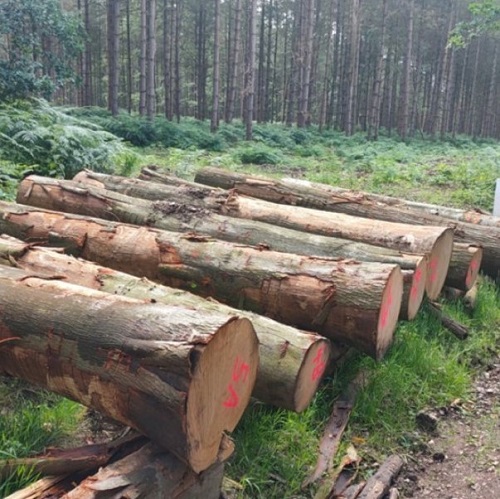New 'timber construction roadmap' published with help of Edinburgh Napier expertise
Edinburgh Napier University expertise has played a major part in a new strategy for the future of timber construction, which has been published by the UK Government.
The Timber in Construction Roadmap is described as a vision to boost the safe use of sustainable timber in construction and increase domestic supply – as part of the effort to reduce emissions and reach net zero.
Currently 80% of the timber the UK currently uses is imported. It is hoped that increasing domestic capacity will create new green jobs in the forestry and wood processing sectors, which contribute more than £2bn to UK economy.
The publication follows a pledge made by the UK and 16 other countries at the COP28 climate summit, which is drawing to a close in the UAE, to advance “policies and approaches that support low carbon construction and increase the use of wood from sustainably managed forests”.
Professor Robert Hairstans and Dr Dan Ridley-Ellis from ENU’s School of Computing, Engineering & the Built Environment were heavily involved with the process of putting together the roadmap, as members of the core working group – helping to determine the priorities and issues, and assisting with the drafting of the text.
The working group also included Sam Hart from Built Environment – Smarter Transformation (BE-ST), which is hosted by the University.
The work of Edinburgh Napier University over many years not only contributed to shaping the strategy, but will also be essential for delivering on its priorities - particularly:
- Promoting the safe, sustainable use of timber as a construction material
- Increasing skills, capacity, and competency across the supply chain
- Promoting innovation and high performing timber construction systems
UK Government Forestry Minister Rebecca Pow said: “Investing in timber is investing in growth and levelling up. The built environment is responsible for a huge proportion of UK carbon emissions, and using home-grown timber in construction is key to reducing emissions.
“Promoting the use of timber as a building material is a key part of the government’s Net Zero Strategy. It will innovate the economy, play a role in creating green jobs and also help meet our tree-planting targets.”
The roadmap
The contribution of Edinburgh Napier University is mentioned several times within the roadmap, including in relation to “opportunities for re-use and recycling of timber”, the “Timber in Construction Skills Action Plan” and the need for work “to better promote and utilise the strength and density of homegrown softwood in construction”.
As part of his work on this, Professor Hairstans was also representing the New Model Institute of Technology and Engineering (NMITE). It has already been working strategically with ENU – including on the “Building from England’s Woodlands” project, which addresses the call for greater use of English grown hardwoods in the built environment.
The roadmap has been published just days after the launch of the “National Wood Strategy for England” – an industry-led initiative with representation from DEFRA, Forestry Commission and Forestry England.
Edinburgh Napier University also provided feedback in its creation and will also be a key part of delivering on its key actions, especially:
- Invest in accelerated research, development and manufacturing of long-term products made from a range of tree species grown in the UK, now and in the future
- Explore opportunities for improving resource efficiency and adding value
- Support and fund research into the structural characteristics of wood from selected conifer species
Timber track record
The contribution to this report is the latest example of Edinburgh Napier University’s central involvement in the UK’s timber construction sector.
The University’s internationally acclaimed work in timber engineering, sustainable construction and wood science claimed a Queen’s Anniversary Prize in 2015, while it also played a significant role in the 2021 Research Excellence Framework assessment, which deemed ENU’s work to be “internationally excellent” and “world-leading”.
More recently, there has been strategic work alongside the New Model Institute of Technology and Engineering and Timber Development UK to establish a centre of timber engineering excellence, with an emphasis on upskilling and reskilling industry professionals.
Researchers are also working with the Forestry Commission to investigate scalable offsite modern methods of construction capable of utilising English Forest Resource and the commercialisation of home-grown wood fibre insulation.
This follows many years of research into the properties and strength grading of home-grown softwoods through the “Strategic Integrated Research in Timber” network, which also includes influential work in British and European Standards committees.
Edinburgh Napier continues to lead pioneering research into industrialised timber and offsite construction solutions as host to BE-ST. You can find out more about the work in the video below.

